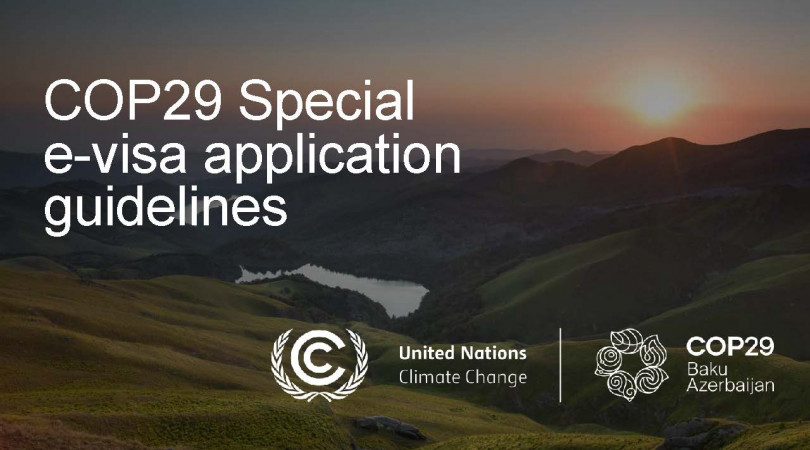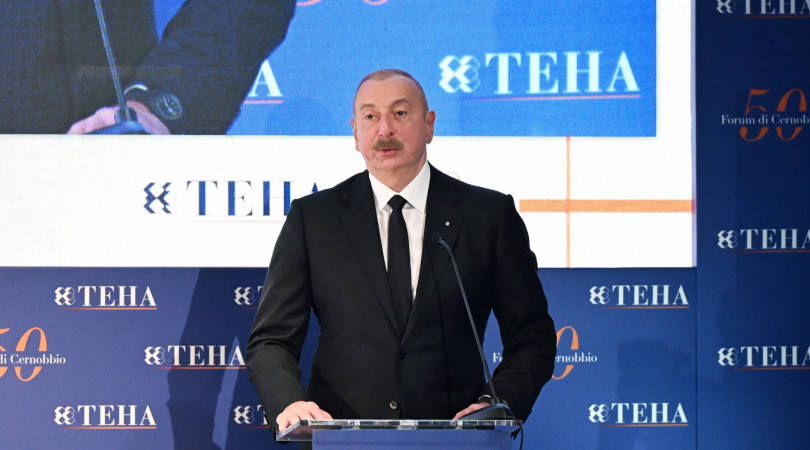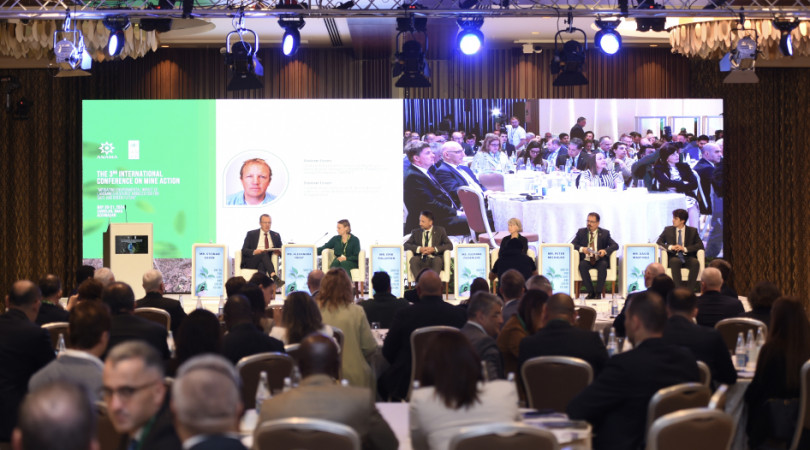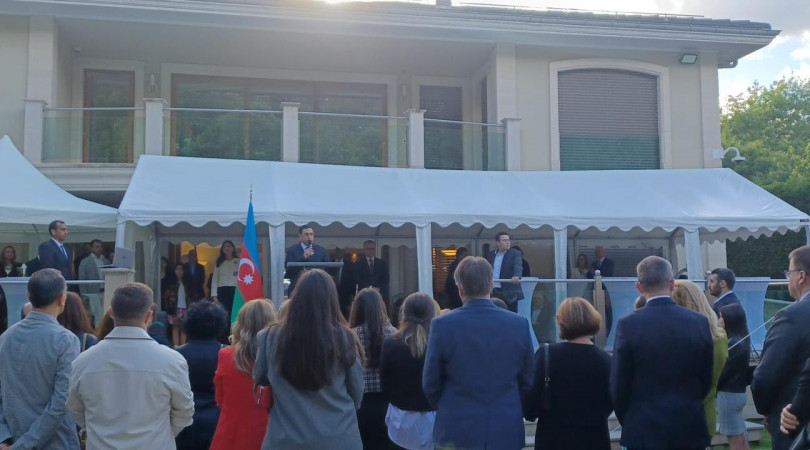Cooperation with the United Nations
Cooperation between the Republic of Azerbaijan and the United Nations was established soon after the collapse of the Soviet Union and after Azerbaijan restored its independence.
The Republic of Azerbaijan was admitted into the United Nations on March 2, 1992 and the Permanent Mission of the Republic of Azerbaijan to the United Nations was opened in New-York on May 6, 1992. Beginning from the very first day of the cooperation with the United Nations Azerbaijan used the platform of the United Nations to draw the international community's attention to the Armenian-Azerbaijan conflict and use United Nations potential for its peaceful settlement. During 1993 the UN Security Council adopted four resolutions 822, 853, 874 and 884 on the Armenian-Azerbaijan conflict. Each of the abovementioned resolutions was adopted following the subsequent occupation of Nagorny Karabakh region and other territories of the Republic of Azerbaijan by the Armenian armed forces. These resolutions reaffirmed the territorial integrity of Azerbaijan, demanded immediate cease-fire, suspension of hostilities and withdrawal of all occupying forces from the territory of the Republic of Azerbaijan. Regrettably, the provisions of the resolutions have still not been implemented.
Expressing with great concern that the humanitarian situation in Azerbaijan continued to deteriorate seriously and the number of refugees and internally displaced persons (IDP) in Azerbaijan exceeded 1 million, in 1993 at its 85th plenary meeting the UN General Assembly adopted resolution "Emergency international assistance to refugees and displaced persons in Azerbaijan" (A/RES/48/114).
During the period 1992 to 1996 the UN Secretary-General and the President of the Security Council made several statements on the conflict confirming the territorial integrity and sovereignty of the Republic of Azerbaijan and supporting the OSCE Minsk Group's efforts towards its peaceful settlement.
Since 1996 the UN General Assembly in its resolution "Cooperation between United Nations and Organization for Security and Cooperation in Europe (OSCE)" reaffirms territorial integrity of Azerbaijan ("the conflict in and around the Nagorny Karabakh region of the Republic of Azerbaijan").
Azerbaijan takes an active part in the work of the UN General Assembly. In 1994 and 1995 at the 49th and 50th sessions of the UN General Assembly President of the Republic of Azerbaijan Heydar Aliyev headed the Delegation of the Republic of Azerbaijan. In September 2000 he also joined the work of the UN Millennium Summit and delivered a speech highlighting security and globalization problems, emphasizing the Azerbaijan's contribution to the positive development of globalization as well as security issues in the South Caucasus. In September 2003 then Premier Minister Ilham Aliyev addressed the 58th session of the UNGA focusing on regional and international security threats and the national socio-economic development.
Azerbaijan maintains cooperation with a wide range of specialized UN agencies and bodies in a very active and effective manner - UNDP, UNICEF, UNHCR, UNESCO, UNCTAD, IAEA and etc.
The cooperation between Azerbaijan and the United Nations Children's Fund (UNICEF) is focused on the alleviation of the conditions for children and teenagers among the refugees and IDPs. Azerbaijan was a member of the Executive Board of UNICEF for the terms 1995-1997, 1998-2000.
Azerbaijan has been actively participating in the work of other various UN bodies and agencies. Azerbaijan was a member of the Commission of the Status of Women (2000-2002). Azerbaijan is also a main sponsor of the Commission's annual resolution "Release of women and children taken hostage, including those subsequently imprisoned, in armed conflicts".
The Republic of Azerbaijan has special links with appropriate UN agencies and bodies such as the United Nations Development Programme (UNDP) and the United Nations Industry Development Organization (UNIDO). Different projects and programmes aimed at improving living standards, structural adjustments of economy are carried out in close cooperation with them.
Particularly, UNDP has provided extensive support to the process of post-conflict rehabilitation by funding and developing the capacity of the Azerbaijan Rehabilitation and Reconstruction Agency (ARRA) and the Azerbaijan National Agency for Mine Action (ANAMA). UNDP support to ARRA has facilitated the effective coordination of work in the sector by the World Bank, UNDP, the United Nations High Commissioner for Refugees (UNHCR), the European Union (EU) Technical Assistance to the Commonwealth of Independent States (TACIS) programme and others.
Azerbaijan views the transformation of its economic and political system as a high priority in its efforts to bring the country more in line with modern norms and standards. An important part of this process is the strengthening of democratic infrastructures, greater transparency and public participation in political debates and decision-making processes. To create employment and stimulate the economy UNDP help the Government of Azerbaijan to address those institutional and policy issues most critical to the effective development and growth of private sector. In an effort to deepen structural reforms, UNDP works closely with the World Bank on a public-sector reform programme in Azerbaijan.
As a result of Armenian aggression, there are about 1 million refugees and internally displaced persons in Azerbaijan. Since 1993 the government of the Republic of Azerbaijan and the United Nations High Commissioner for Refugees (UNHCR) closely work to alleviate the conditions of refugees and IDPs.
Taking into account the critical importance of the education, science and cultural issues Azerbaijan practices a large-scale cooperation with the United Nations Education, Science and Cultural Organization (UNESCO) and for this purpose in 1994 according to the President Decree Azerbaijan established National Committee for UNESCO.
Different Ministries and Agencies of Azerbaijan cooperate directly with their appropriate partners within the UN system (for example, Ministry of Health and World Health Organization).
The Republic of Azerbaijan is a co-sponsor of a number of resolutions adopted by the UN General Assembly and other UN bodies. The National Delegation put forward its own resolutions. Thus, the Delegation of Azerbaijan initiated the resolution "missing persons" at the 58-60th sessions of the United Nations Commission on Human Rights (CHR). The provisions of this resolution adopted by CHR are based on the well-known rules of international humanitarian law and draw attention to an important issue which, in opinion of Azerbaijan is not given due attention and consideration at the international for a.
Azerbaijan actively takes part in election process by nominating its representatives to the appropriate UN agencies and bodies. As it was mentioned, Azerbaijan was a member of Executive Board of UNICEF for the terms 1995-1997 and 1998-2000, the Commission of the Status of Women in 2000-2002, the Committee on Sustainable Development in 2002-2004. Azerbaijan was elected a member of ECOSOC for the period of 2003-2005.
Past three years due to the increased attention of the international community and the UN particularly to the counter-terrorism activity, Azerbaijan makes its own contribution to the global campaign against terror. In the UN framework, Azerbaijan actively cooperates with the UNSC Counter-Terrorism Committee (CTC) and has submitted three national reports (S/2001/1325, S/2002/1022, S/2003/1085).
Azerbaijan recognizes a vital role of the United Nations, first of all, in establishing and maintaining international peace and security, as well as in sustainable development and democratization. Azerbaijan supports the idea of the reform within the UN so as the Organization will be able to tackle with problems and challenges of the Twenty-first century.
In October 2011, Azerbaijan was elected a non-permanent member of the Security Council of the United Nations for the first time in its short history. The election of the Republic of Azerbaijan to the UN Security Council through the votes of 155 member countries was clear and obvious indicator of the respect Azerbaijan has earned globally and recognition of our contribution to global security. During its chairmanships at the UN Security Council in May 2012 and in October 2013 Azerbaijan continued to uphold the norms and principles of international law and the common justice at the international relations as a whole. Azerbaijan completed its membership of the UNSC in December 2013.


















